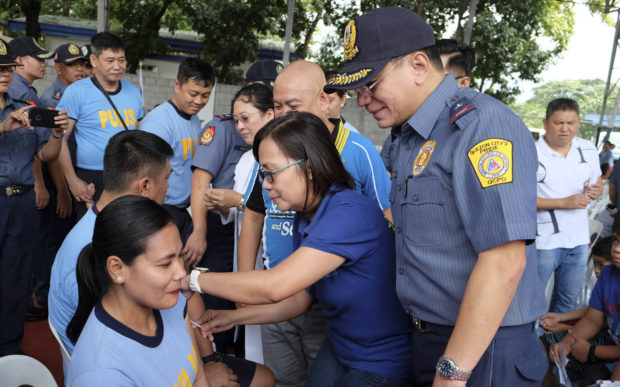
NOT JUST FOR KIDS The antidengue vaccination program that the Department of Health suspended on Friday also covered policemen, like these members of the Quezon City Police District under Chief Supt. Guillermo Eleazar (right), who got their shots on Sept. 1. —NIÑO JESUS ORBETA
The Department of Health (DOH) has suspended a massive dengue immunization program and on Friday ordered the close observation of those who had received the world’s first antidengue vaccine after its manufacturer admitted it could worsen the disease in some cases.
The French pharmaceutical giant, Sanofi Pasteur, announced on Wednesday that its vaccine, Dengvaxia, could lead to more severe symptoms for people who had not previously been infected.
Sanofi said that a new study has confirmed Dengvaxia’s benefits for “those who had prior infection.”
Program on hold
However, it added: “For those not previously infected by dengue virus, however, the analysis found that in the longer term, more cases of severe disease could occur following vaccination upon a subsequent dengue infection.”
“In the light of this new analysis, the DOH will place the dengue vaccination program on hold while review and consultation is ongoing with experts, key stakeholders and the World Health Organization (WHO),” Health Secretary Francisco Duque III said in a press briefing.
Duque said WHO’s Strategic Advisory Group of Experts on Immunization would meet on Dec. 12 or 13 to discuss the latest developments.
The DOH said more than 733,000 public schoolchildren 9 years old and above in three highly endemic regions—Metro Manila, Central Luzon and Calabarzon—have received at least the first of three doses of the first licensed dengue vaccine under a P3.5-billion immunization drive, the world’s first such program.
Mandatory history taking
The health chief said they would be closely monitoring the health conditions of all vaccine recipients under the immunization program, which started in early 2016.
There would be mandatory history taking of all vaccine recipients by the concerned rural health units, local hospitals, and even private health facilities, he said.
The DOH would also require hospitals to report cases of vaccine recipients being treated regardless of the symptoms.
“We need to ensure that we can monitor and conduct investigation on these cases while also providing supportive care if necessary,” said Duque.
He added that officials would review the DOH contract with Sanofi and look into the circumstances surrounding the immunization program to determine if anyone should be held liable.
Health officials said the suspension of the dengue immunization program covers only state-run health-care providers.
“The private physicians have a different program altogether. It will be up to the health provider if he or she would like to put on hold implementing the program as well,” said Benjamin Co of the Food and Drug Administration (FDA), which had licensed the vaccine and approved its use in the country.
Co said the FDA would also suspend the sale of Dengvaxia. Sanofi would have to apply for a change in product information in leaflets inside boxes containing the vaccine, he said.
Dengvaxia vaccines could not be sold until the product information has been changed, he said.
Duque allayed fears, especially of parents whose children had received the vaccine, particularly those with no prior infection.
Brazil, too
“The vaccine has a 30-month protection period against dengue, regardless if the child had prior infection or not,” he said.
“For those who were infected prior to receiving the vaccine, there is a 93-percent reduction in severity of the disease and 82-percent reduction in hospitalizations,” said Julius Leccioness, chief of the Philippine Children’s Medical Center.
Lecciones said the other country that also embarked on mass vaccination, Brazil, reported no severe cases attributable to Dengvaxia and decided to continue its program.
There has been no “severe” case among those who had already been vaccinated and Duque said he was awaiting Sanofi’s clarification of what “cases of severe disease” meant.
Khristine Estrada-Cabanayan, a Sanofi spokesperson in the Philippines, said the company was working closely with the DOH and would release a statement to address concerns regarding the vaccine.
Duque said the government had already paid Sanofi P3 billion for the vaccine.
The DOH still has 789,000 doses of the 300 million that were purchased. More than 500,000 are stored at the Research Institute for Tropical Medicine, which would expire in August next year, said Health Undersecretary Gerardo Bayugo.
Plunder charges
There are other stocks at the Philippine Children’s Medical Center, in Region IV-A and in the National Capital Region.
Health advocates are pressing the DOH to file plunder charges against those who implemented the vaccination program.
Duque refused to comment without a review of all the documents and contracts and the circumstances surrounding the immunization program.
The massive program was launched under Health Secretary Janette Garin despite staunch opposition from several medical experts who said the DOH should wait until the study on the vaccine was completed and had enough safeguards for those who would receive it.
Dengue fever and dengue hemorrhagic fever, which are transmitted by the Aedes aegypti mosquito, are acute viral infections that affect infants, young children and adults. About 200,000 dengue cases are reported yearly, according to the DOH. —WITH THE WIRES